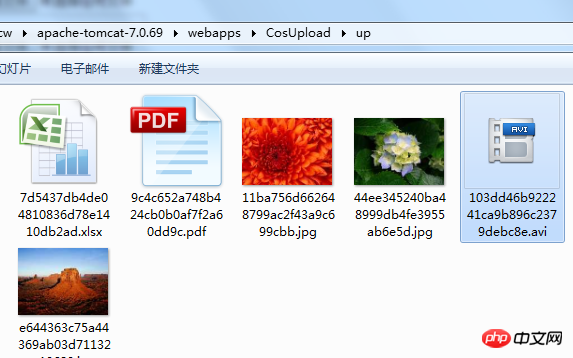Detailed explanation of using COS to implement file upload function in Java
cos is an OpenSource component developed by O'Rrilly for HTTP upload files. Through this article, I will share with you how to use COS to implement the file upload function. Friends who are interested should take a look.
cos is an OpenSource component developed by O'Rrilly for HTTP file upload
Require cos.jar
Cos uploading files is very simple, simpler than fileupload: But I tried the maximum upload size, which is more than 800 megabytes. If it exceeds, it will crash directly:
java.io.IOException : Posted content length of 1627105576 exceeds limit of 889192448 --->byte, more than 800M

Just one servelt is enough:
package com.lhy.upload;
import java.io.File;
import java.io.FileOutputStream;
import java.io.IOException;
import java.io.OutputStream;
import java.io.PrintWriter;
import java.util.Enumeration;
import java.util.UUID;
import javax.servlet.ServletException;
import javax.servlet.annotation.WebServlet;
import javax.servlet.http.HttpServlet;
import javax.servlet.http.HttpServletRequest;
import javax.servlet.http.HttpServletResponse;
import com.oreilly.servlet.MultipartRequest;
import com.oreilly.servlet.multipart.FileRenamePolicy;
/**
* CosServlet
* 在Cos中就一个类,
* MultipartRequest它是request的包装类。
*/
@WebServlet(name="CosServlet",urlPatterns="/CosServlet")
public class CosServlet extends HttpServlet{
@Override
protected void doPost(HttpServletRequest req, HttpServletResponse resp) throws ServletException, IOException {
//第一步,声明文件的保存目录
String path = getServletContext().getRealPath("/up");
//第二步:文件上传
//声明文件重新命名策略,默认的不行不能重命名,自己实现FileRenamePolicy接口
// FileRenamePolicy rename = new DefaultFileRenamePolicy();
MultipartRequest multiReq = new MultipartRequest(req, path, 1024*1024*100, "UTF-8",new MyRename());
//输出所上传的文件的信息
Enumeration fileNames = multiReq.getFileNames();
while(fileNames.hasMoreElements()){
String name = (String)fileNames.nextElement();
File file = multiReq.getFile(name);//得到上传的文件
if(null != file){
String fileName = multiReq.getFilesystemName(name); //取得文件名
String contentType = multiReq.getContentType(name);//类型
System.out.println("上传的文件: " +fileName+", 文件类型: "+contentType);
}
}
//输出所提交的表单中其它文本输入域的值
Enumeration formValue = multiReq.getParameterNames();
while(formValue.hasMoreElements()){
String param = (String)formValue.nextElement();
String value = multiReq.getParameter(param);
System.out.println(value);
}
//第三步:如果知道input的name,还可以直接获取信息,
/*resp.setContentType("text/html;charset=UTf-8");
PrintWriter out = resp.getWriter();
out.print("文件名称1:"+multiReq.getOriginalFileName("img1"));
out.print("<br/>新名称:"+multiReq.getFilesystemName("img1"));
out.print("<br/>类型1:"+multiReq.getContentType("img1"));
out.print("<br/>大小1:"+multiReq.getFile("img1").length());
out.print("<br/>说明:"+multiReq.getParameter("desc1"));
if(multiReq.getContentType("img1").contains("image/")){
out.print("<img width='300px' height='200px' src='"+req.getContextPath()+"/up/"+multiReq.getFilesystemName("img1")+"'></img>");
}
out.print("<hr/>");
out.print("文件名称2:"+multiReq.getOriginalFileName("img2"));
out.print("<br/>类型2:"+multiReq.getContentType("img2"));
out.print("<br/>大小2:"+multiReq.getFile("img2").length());
out.print("<br/>说明2:"+multiReq.getParameter("desc2"));
//
out.print("<hr/>");
out.print("文件名称3:"+multiReq.getOriginalFileName("img3"));
out.print("<br/>类型3:"+multiReq.getContentType("img3"));
out.print("<br/>大小3:"+multiReq.getFile("img3").length());
out.print("<br/>说明3:"+multiReq.getParameter("desc3"));*/
}
}
/**
* 重命名策略,
*/
class MyRename implements FileRenamePolicy{
@Override
public File rename(File file) {
String fileName = file.getName();
String extName = fileName.substring(fileName.lastIndexOf("."));
String uuid = UUID.randomUUID().toString().replace("-","");
String newName = uuid+extName;//abc.jpg
file = new File(file.getParent(),newName);
return file;
}
}Form :
<form action="<c:url value='/CosServlet'/>" method="post"
enctype="multipart/form-data">
File1:<input type="file" name="img1"><br /> 说明1:
<input type="text" name="desc1"><br />
File2:<input type="file" name="img2"><br/>
说明2:<input type="text" name="desc2"><br/>
File3:<input type="file" name="img3"><br/>
说明3:<input type="text" name="desc3"><br/>
<input type="submit" />
</form>Start uploading:

Server:

Summarize
The above is the detailed content of Detailed explanation of using COS to implement file upload function in Java. For more information, please follow other related articles on the PHP Chinese website!

Hot AI Tools

Undresser.AI Undress
AI-powered app for creating realistic nude photos

AI Clothes Remover
Online AI tool for removing clothes from photos.

Undress AI Tool
Undress images for free

Clothoff.io
AI clothes remover

AI Hentai Generator
Generate AI Hentai for free.

Hot Article

Hot Tools

Notepad++7.3.1
Easy-to-use and free code editor

SublimeText3 Chinese version
Chinese version, very easy to use

Zend Studio 13.0.1
Powerful PHP integrated development environment

Dreamweaver CS6
Visual web development tools

SublimeText3 Mac version
God-level code editing software (SublimeText3)

Hot Topics
 1376
1376
 52
52
 Square Root in Java
Aug 30, 2024 pm 04:26 PM
Square Root in Java
Aug 30, 2024 pm 04:26 PM
Guide to Square Root in Java. Here we discuss how Square Root works in Java with example and its code implementation respectively.
 Perfect Number in Java
Aug 30, 2024 pm 04:28 PM
Perfect Number in Java
Aug 30, 2024 pm 04:28 PM
Guide to Perfect Number in Java. Here we discuss the Definition, How to check Perfect number in Java?, examples with code implementation.
 Random Number Generator in Java
Aug 30, 2024 pm 04:27 PM
Random Number Generator in Java
Aug 30, 2024 pm 04:27 PM
Guide to Random Number Generator in Java. Here we discuss Functions in Java with examples and two different Generators with ther examples.
 Weka in Java
Aug 30, 2024 pm 04:28 PM
Weka in Java
Aug 30, 2024 pm 04:28 PM
Guide to Weka in Java. Here we discuss the Introduction, how to use weka java, the type of platform, and advantages with examples.
 Smith Number in Java
Aug 30, 2024 pm 04:28 PM
Smith Number in Java
Aug 30, 2024 pm 04:28 PM
Guide to Smith Number in Java. Here we discuss the Definition, How to check smith number in Java? example with code implementation.
 Java Spring Interview Questions
Aug 30, 2024 pm 04:29 PM
Java Spring Interview Questions
Aug 30, 2024 pm 04:29 PM
In this article, we have kept the most asked Java Spring Interview Questions with their detailed answers. So that you can crack the interview.
 Break or return from Java 8 stream forEach?
Feb 07, 2025 pm 12:09 PM
Break or return from Java 8 stream forEach?
Feb 07, 2025 pm 12:09 PM
Java 8 introduces the Stream API, providing a powerful and expressive way to process data collections. However, a common question when using Stream is: How to break or return from a forEach operation? Traditional loops allow for early interruption or return, but Stream's forEach method does not directly support this method. This article will explain the reasons and explore alternative methods for implementing premature termination in Stream processing systems. Further reading: Java Stream API improvements Understand Stream forEach The forEach method is a terminal operation that performs one operation on each element in the Stream. Its design intention is
 TimeStamp to Date in Java
Aug 30, 2024 pm 04:28 PM
TimeStamp to Date in Java
Aug 30, 2024 pm 04:28 PM
Guide to TimeStamp to Date in Java. Here we also discuss the introduction and how to convert timestamp to date in java along with examples.




